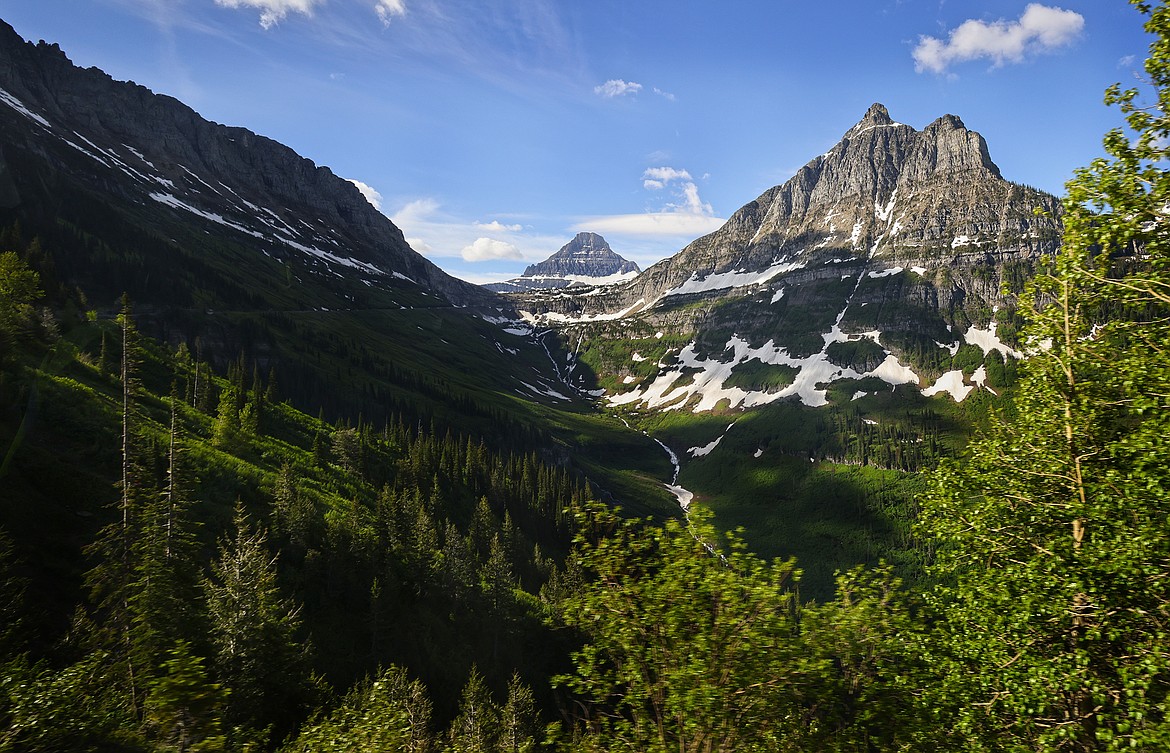Full length of Going-to-the-Sun Road opens to vehicles
Matching the latest opening on record, the full length of Going-to-the-Sun Road in Glacier National Park opened to vehicles Wednesday morning for the 2022 summer season.
Motorists can access Logan Pass from both the west and east entrances with a reservation.
Historically, Going-to-the-Sun-Road had late openings on July 13 in both 2011 due to snowpack and 2020 due to the Covid-19 pandemic. These are the latest recordings of the road opening, besides its original opening on July 15, 1933, according to a park press release.
Park officials attribute this year's late opening to late winter weather, making it difficult for road crews to clear the road during continued avalanche danger.
While driving along the road, particularly through the Rim Rock area 1 mile west of Logan Pass, visitors should be aware of potential rockfall and should not slow down or stop in this section, the park warned. Rocks and other debris continue to fall throughout the summer, requiring daily clean up.
The Highline Trail and Hidden Lake Trail from Logan Pass, Oberlin Climbing Route, and a portion of the Grinnell Trail remains closed due to hazardous snow conditions and emerging vegetation. For up-to-date information on trail conditions and clearing activities, visit the park’s trail status webpage.
VEHICLE RESERVATIONS are needed to enter the Going-to-the-Sun Road corridor at the West Glacier entrance, Camas entrance and Rising Sun checkpoint (located 6 miles west of the St. Mary entrance) from 6 a.m. until 4 p.m. each day.
In the North Fork area of the park, reservations are required between 6 a.m. and 6 p.m. 24-hour advanced reservations are released at 8 a.m. MDT the day before the effective date on Recreation.gov.
Reservations are not required for any other portions of the park (for example Many Glacier, Two Medicine, Cut Bank, Walton, Goat Lick, St. Mary or Chief Mountain Highway) and visitors are still subject to the per vehicle entrance pass fee. These areas are congested, and visitors can expect traffic restrictions between 10 a.m. and 2 p.m.
Visitors with service reservations along Going-to-the-Sun Road corridor and in the North Fork area of the park do not need a vehicle reservation. Valid service reservations will serve as a vehicle reservation for the day of the service reservation and include lodging, camping, commercial tours, etc.
With Going-to-the-Sun Road fully open, the number of vehicle reservations available will be increased, the park press release said. This increase will be executed through a series of additional reservation releases made available each morning starting July 13 at 8 a.m. Advanced reservations are exclusively available on Recreation.gov. Visitors will not be able to obtain a reservation at the park.
Additional details for Going-to-the-Sun Road reservation system may be found on Glacier National Park’s Website.
THE PARK'S free shuttle service along Going-to-the-Sun Road will be operational this year under a first come-first served system with stops at the Apgar Visitor Center, Sprague Creek Campground, Lake McDonald Lodge Avalanche Creek, The Loop, Logan Pass, Siyeh Bend, Gunsight Pass, St. Mary Falls, Sunrift Gorge, Sun Point, Rising Sun, and the St. Mary Visitor Center. Please check the park website for additional information on shuttle stops.
At times when Flathead or Glacier county COVID-19 community levels are high, face masks will be required on shuttles.
Services at Logan Pass include restroom facilities and potable water. Visitor information services will be provided at the Logan Pass Visitor Center from 9 a.m. to 7 p.m. daily starting July 14.
The Glacier National Park Conservancy bookstore will be operating inside the Logan Pass Visitor Center, with access at the upper level. The visitor center entrances will have construction beginning July 14 however, visitors will still be able to access the inside of the building. At times when county Covid-19 transmissions are high, face masks will be required in all federal buildings including visitor centers, hotels and restaurants.
There will be some major work zones on Going-to-the-Sun Road this summer. Visitors will not be able to access Going-to-the-Sun Road from the West Entrance before 6 am due to night-time construction along Lake McDonald. There will be nightly closures between 10 p.m. and 6 a.m., from the foot of Lake McDonald to just west of the Sprague Creek Campground. Vehicles will have one opportunity at midnight to be piloted through the nightly closures. During the day, traffic lights will control a single lane through the construction area.
Construction crews are also installing a new vault toilet at Big Bend that is scheduled to be complete by the end of July. Until construction is complete, Big Bend will have less parking available. Visitors need to be on the lookout for work zones, slow down, and give the construction workers a wide berth.
Vehicles and vehicle combinations longer than 21 feet, and/or wider than 8 feet, are prohibited on Going-to-the-Sun Road between Avalanche Campground and Rising Sun. Vehicles over 10 feet in height may have difficulty driving west from Logan Pass due to rock overhangs.
Bicyclists are reminded that bicycle safety restrictions on Going-to-the-Sun-Road are in effect, and remain in effect through Labor Day, September 5. Bicycles are prohibited in certain areas between 11 a.m. and 4 p.m.
Information on bicycle restrictions may be found in the park newspaper available at park entrance stations, or online on the park’s bicycle information webpage.
Visitors are encouraged to limit vehicle idling to no more than two minutes in Glacier in parking lots, at scenic viewpoints and trailheads, and while stopped in traffic lines and road construction to benefit the health of both the public and the park resources.
Visitors should not throw food waste, including apple cores, orange peels, sunflower seeds, unwanted drinks (coffee, tea, soda) etc., out car windows while waiting in lines. This attracts wildlife to the roadways which increases wildlife fatalities. Discard garbage in bear-proof garbage cans.

